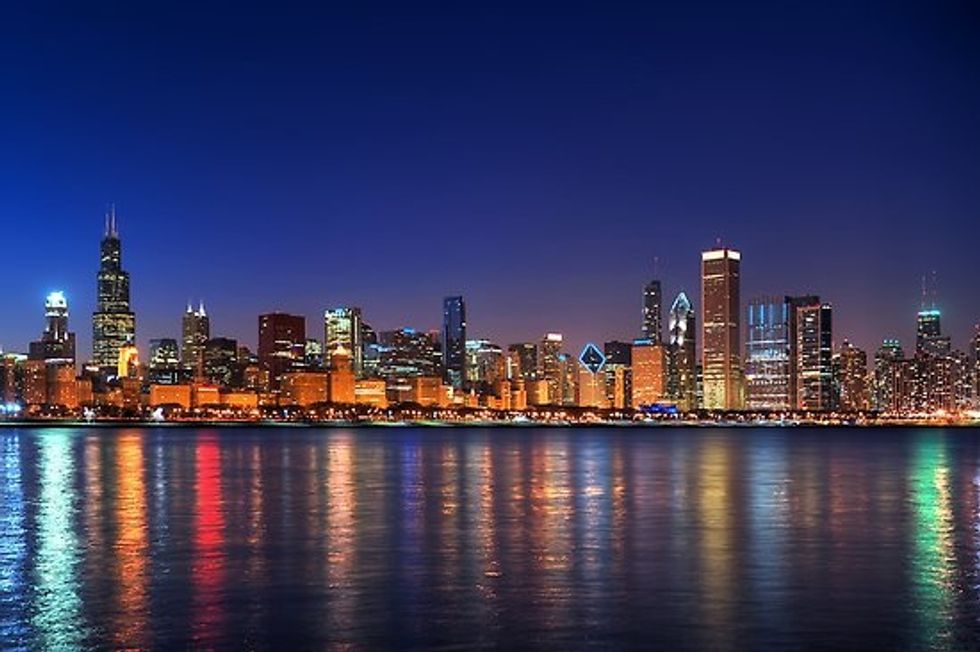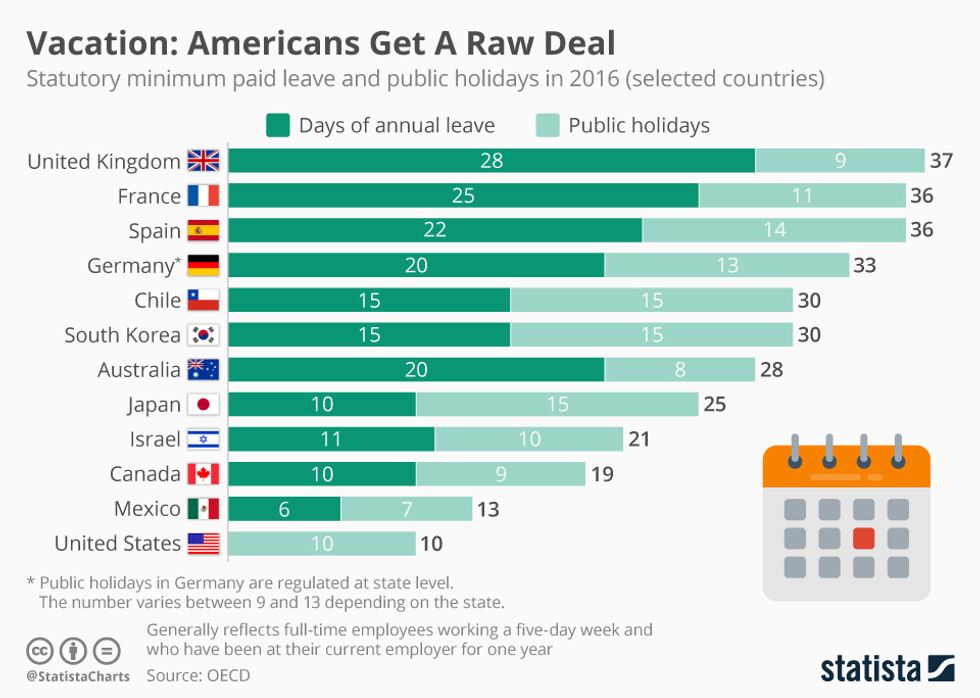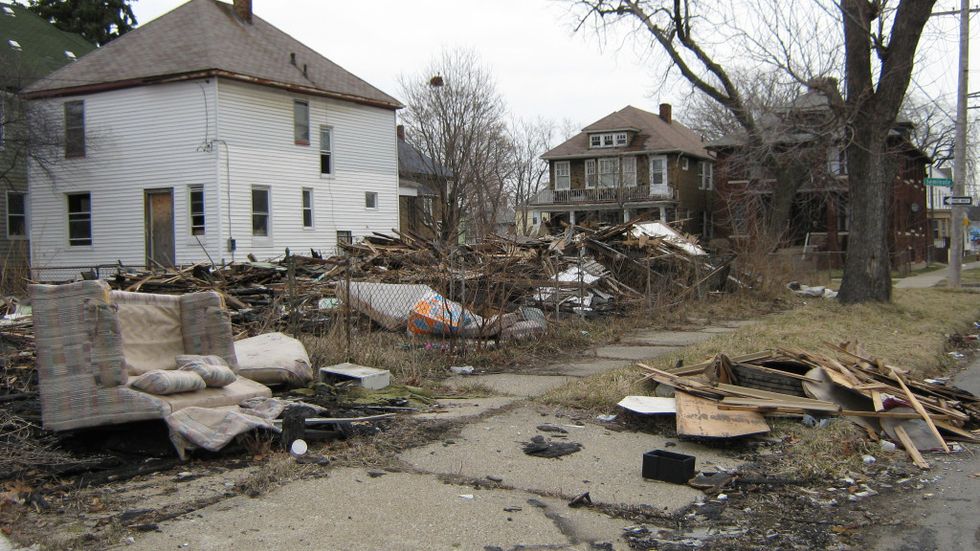The Green New Deal - originally the brainchild of Alexandria Ocasio Cortez (Socialist from New York) has been making the news recently. Before we begin, I would just like to thank my brother for helping me to find some statistics and images for this report as well as helping me write some aspects of it. I am personally very much against the notion that our country should mobilize behind this cause due to several unfeasible financial demands, and several innovations that would absolutely devastate the American economy. Should our country get behind this; I absolutely do not think that we should. This would spell absolute economic and social ruin for the world's greatest nation: The United States of America
So, let's break this 'Green New Deal' down, shall we? I put my opinion within each section as to why I believe this would be like sounding the death bell for the United States of America.
Objective #1: "Meeting 100 percent of the power demand in the United States through clean, renewable, and zero-emission energy sources"
Meeting 100% of America's power demand through renewable energy presents a whole host of problems that, quite frankly, make this objective impossible to reach within any reasonable time frame. For starters, the cost of replacing America's entire energy grid with renewable energy is estimated to cost somewhere in the ballpark of 5 trillion dollars. This does not account for the cost of maintenance (though it should be minimal) and more importantly the cost of storing all the energy generated by renewable sources (which should be astronomically expensive and environmentally unfriendly).
The cost of storing power from peak energy producing times would wipe out any benefits there may be from the cheaper production costs of renewable energy because the batteries which would be used to store the energy are both expensive and temporary (they must be replaced). Initially, a system with the ability to store enough energy to cover only 80% of America's electricity demand for 12 hours would cost nearly 2.5 trillion dollars. At 100% the cost would rise sharply.
One illustration of this phenomena is shown by a graph of California's projected energy costs as renewable energy implementation rises:
Storage is also vital to the implementation of renewable energy because renewable energy cannot continuously provide a constant source of power to meet America's constant demand for energy throughout the year. Again, I present you a graph of California's seasonal renewable energy production:
I use California as an example not to bash liberals but to show the effects of moving to renewable energy (they are a leader in RE).
In my opinion Objective #1 is doomed to fail from the start because there are too many obstacles for it to be implemented in a cost-effective manner. But anyway, moving onto Objective #2.
Objective #2: Building or upgrading to energy-efficient, distributed, and 'smart' power grids, and working to ensure affordable access to electricity
If I'm being honest, I didn't know what a smart power grid was until I looked it up. This is what I found.
The smart grid has the potential to bring the United States a more stable, economical, and environmentally friendly electrical system. Unfortunately, it is far from the unalloyed plus portrayed to the public. The cost will be high: Although the economic stimulus program approved by Congress last year included $4.5 billion to help create the smart grid, the full build-out will cost at least a couple of hundred billion dollars more. The potential savings will justify the cost only if the smart grid brings sweeping changes in the way consumers use and pay for electricity. But these changes have the potential to saddle them with unnecessarily high prices, force them to bear unnecessary risks, and make their local utility company an uninvited participant in the intimate details of their everyday lives.
Is the Smart Grid Really a Smart Idea? | Issues in Science and Technology
As I understand it, the smart grid comes with many bells and whistles that mostly have to do with monitoring and providing data on energy usage. I'm no expert on the smart grid so if anyone wants to chime in that would be much appreciated, but initially, I'm left with the question: are the benefits worth the cost? That remains to be answered.
Objective #3: Upgrading all existing buildings in the United States and building new buildings to achieve maximum energy efficiency, water efficiency, safety, affordability, comfort, and durability, including through electrification.
As of 2012, the Commercial Buildings Energy Consumption Survey estimates that there are 5.6 million commercial buildings in the United States. No one knows what the cost of making each one of those buildings "green" would be. We don't even know what criteria a building must meet in order to be considered "green" is. With the different standards and regulations, the government is bound to impose, Objective #3 seems like a bureaucratic nightmare. I'd say it's a big fat NOPE from me.

Objective #4: Overhauling transportation systems in the United States to eliminate pollution and greenhouse gas emissions from the transportation sector as much as is technologically feasible, including through investment in (i) zero-emission vehicle infrastructure and manufacturing; (ii) clean, affordable, and accessible public transportation; and (iii) high-speed rail.
Let's dissect this one by one.
First, funding zero-emission vehicle infrastructure should not necessarily be too difficult. The question is of whether or not it is necessary. If people aren't using green modes of transportation then there is no need for green infrastructure to support them. This brings us to our next point. Increasing zero-emission vehicle manufacturing will be nearly impossible to achieve if nobody wants to buy eco-friendly vehicles in the first place. Subsidies provided to eco-friendly car producers and tax breaks given to eco-friendly car customers have proven relatively ineffective in the past so it remains to be seen how zero-emission vehicle manufacturing can be boosted.
Second, replacing our nation's current transportation vehicles with environmentally friendly ones will take a substantial initial investment on the part of the government. One of the chief benefits of doing this would be to reduce the costs associated with operating gas-powered transportation vehicles. On the flip side, gas prices have been kept relatively low in recent years negating some of the benefits that comes with operating environmentally friendly vehicles.
Third, well, we all know what happened to California's high-speed rail. Why would one that is built by the Federal government fare any better? In the words of Gavin Newsom (California's governor) it "would cost too much and, respectfully, would take too long to complete." Essentially, he's saying the project just isn't worth it.
Objective #5: Removing greenhouse gases from the atmosphere and reducing pollution, including by restoring natural ecosystems through proven low-tech solutions that increase soil carbon storage, such as preservation and afforestation.
Hip hip hooray! We've found our first fully feasible part of the Green New Deal… plant some trees. I don't even think the government could screw this one up. But then again, they've proven me wrong before…
Next!
Objective #6: Working collaboratively with farmers and ranchers in the United States to eliminate pollution and greenhouse gas emissions from the agricultural sector as much as is technologically feasible.
This objective essentially aims to cut down on… wait for it… animal farts. LOL
Of course, I should've seen this one coming. Right as the Green New Deal made it's first (and only?) sensible point, it had to turn around and make one of the most laughable proposals in the history of deal-making.
How do they think they can even combat cow farts anyway? Change cow's diets? Reduce the number of cows we raise? I don't know about that second idea. Us Americans are a bunch of red-blooded meat eating carnivores. Of all the proposals here, limiting America's access to meat might just be the most likely to cause a domestic uprising.

Objective #7: Guaranteeing a job with a family-sustaining wage, adequate family and medical leave, paid vacations, and retirement security to all people of the United States.
SOCIALISM! SOCIALISM! SOCIALISM!
Ohhhh boy where do I even start?
Guaranteeing everyone a job with a family-sustaining wage… so does that mean one couple is going to earn enough to sustain two families? Where are you going to get all this money? Also, a "family-sustaining wage" will differ depending on where you live. Then there's the loss of incentive for people to work hard/do a good job when they know everything will be handed to them for nothing in return. I could go on and on about how many problems guaranteeing everyone a job would create, but in the interest of keeping paragraph concise, I'll just say it's a stupid idea.
Adequate family and medical leave: What counts for family/medical leave? How many days off will people get? How will this affect our economy and our workers? So many questions and so few answers.
With paid vacation, again the question remains: how many days off will people get? More importantly, though I think is how these paid days off will affect our workers. As with everything else in this world, there are tradeoffs to working less. Most notably workers will be paid less annually because companies don't want to pay more for people who spend less time on the job. Here is a graphic of the countries with the most paid leave.

Now here are the Average annual wages for the top 5 countries on that graph:
- United Kingdom- $43,732
- France- $43,755
- Spain- $38,507
- Germany- $47,585
- Chile- $25,879
And here is the average annual wage for the United States:
- United States: $60,558
Now we've got to ask ourselves: would we rather work less and get paid less or we happy with the way things are right now?
And finally, we have retirement security for all people of the United States. In case Alexandria Ocasio-Cortez didn't know, Social Security is now spending more cash than it is taking in. By 2034 Social Security is expected to spend up to the 2.9 trillion dollars worth of asset reserves we have saved to keep the program afloat. After those assets are depleted, Social Security is estimated to suffer a $13.2 trillion cash shortfall between 2034 and 2092. I don't think spending more on Social Security will fix our problem. We need to either cut benefits or raise revenue or Social Security is toast.
Objective #8: Strengthening and enforcing labor, workplace health and safety, anti-discrimination, and wage and hour standards across all employers, industries, and sectors.
This objective sounds like lots of paperwork, inefficiency, and bureaucracy with more affirmative action and a $15 minimum wage. Terrific, just what this country needs. Just kidding.
The solution to every problem isn't always more government. Last year the Federal Bureaucracy cost taxpayers $58 billion. I'd say we paid $58 billion too much for a bunch of paper pushers. Also, fun fact, the cost of Federal regulations reached $1.88 trillion as of 2014. So you tell me what part of expanding the bureaucracy and pushing more regulations through sounds good for our economy.
Discrimination in the workplace is already illegal so I won't touch that one. Affirmative action doesn't help minorities either and really only adds to worsening race relations. We need equal opportunity and not equal outcome. This ain't it.
Wage and hour standards will only end up hurting the people such standards aim to protect. Raising minimum wage to $15 dollars will force companies to lay off many low skilled workers because even if the minimum wage rises, a company's ability to pay its employees stays the same. Also, machines aren't paid and don't have to follow hour standards. This idea will only hasten automation in the workplace.
Here's a graph of the effects of the $15 minimum wage.
The source from above was taken from my AP Economics class last year.
Objective #9: Providing and leveraging, in a way that ensures that the public receives appropriate ownership stakes and returns on investment, adequate capital (including through community grants, public banks, and other public financing), technical expertise, supporting policies, and other forms of assistance to communities, organizations, Federal, State, and local government agencies, and businesses working on the Green New Deal mobilization.
Ah yes, seizing the means of production. How wonderful. I don't even feel the need to dispute this one. Public ownership is not compatible with our American economic system. Perhaps in Venezuela but not in America.
Objective #10: Providing resources, training, and high-quality education, including higher education, to all people of the United States, with a focus on the frontline and vulnerable communities, so those communities may be full and equal participants in the Green New Deal mobilization.
Free college. Another well-intentioned terrible idea by our friends the benevolent socialists. The cost of providing free higher education to each student in America is estimated to sit at around $75 billion annually. That's no drop in the bucket, but really if it was it still wouldn't even be worth it. Graduating with a college degree isn't anything special when everyone else has one too. It'll just become like a high school diploma: a certificate that you made it through the next stage in your educational journey.
Objective #11: Strengthening and protecting the right of all workers to organize, unionize, and collectively bargain free of coercion, intimidation, and harassment.
Want more unions? Look at Detroit, where labor unions all but killed the automotive industry by demanding ever-increasing wages and benefits thus forcing companies to shut down domestic manufacturing plants and send production overseas. Look at Chicago where teacher unions are sucking the city's budget dry with demands for higher pay and lavish pensions. For that matter look at most any city around America and see how the grip that unions hold over politicians corrupts and dismantles the political process.

What a beautiful day to take a stroll through Motor City.
Objective #12: Obtaining the free, prior, and informed consent of indigenous people for all decisions that affect indigenous people and their traditional territories, honoring all treaties and agreements with indigenous people and protecting and enforcing the sovereignty and land rights of indigenous people.
Sounds about right. We should honor any and all agreements made with indigenous people, or any people for that matter.
Objective #13: Enacting and enforcing trade rules, procurement standards, and border adjustments with strong labor and environmental protections.
So from what I understand this part of the Green New Deal seeks to keep jobs from moving overseas where there are less stringent environmental protection laws. I'm not sure how this could be achieved. Maybe by giving more subsidies to companies who choose to stay in the USA while placing tariffs on imports from countries that don't have environmentally friendly laws? Democrats seem to hate both of those right now though. That probably won't work. I think what is most likely to happen is the rentry of the United States into the Paris Climate Agreement (which was not a good deal but that's an entirely different post) with strict enforcement of the deal.
Objective #14: Providing all people of the United States with — (i) high-quality healthcare; (ii) affordable, safe, and adequate housing; (iii) economic security; and (iv) access to clean water, clean air, healthy and affordable food, and nature.
All of the above have already been tried here and have failed miserably (except iv?).
Providing every person in the USA with high-quality healthcare is impossible to achieve at a reasonable cost. Canada's single-payer healthcare system cost $230 billion in 2016, and they have only 1/10th of the population of the United States. Additionally, the average wait time to see a doctor in Canada is 20 weeks and dental, ambulance and many other services, as well as prescription medications, must be paid for out of pocket. Furthermore, many Canadians come to America to receive treatment for their illnesses because we oftentimes have shorter wait periods and better results for the same procedures. Single payer healthcare doesn't sound so great now, does it?
Creating affordable, safe (emphasis on safe), and adequate housing has already been tried and has, for the most part, been a failure. The nice looking high rise building the government constructs quickly become run down ghettos that are magnets for drugs, crime and gang activity. The government isn't doing the poor any favors by crowding them into unsafe and unsanitary housing projects where the cycle of poverty continues. Obviously, something should be done for the poor, but building more projects isn't that something.
Economic security: see objective #7.
Finally, providing access to clean water, clean air, healthy and affordable food, and nature is complicated…
Obviously providing access to clean water is essential to the health and well being of our nation. One study found that nearly 63 million Americans either currently are or have been exposed to unclean drinking water. That's nearly 1/5 of our population so I suppose that of all the initiatives proposed in objective #14, clean water should take priority. Next, we want clean air which essentially means less pollution. I've already covered pollution so I'll skip over clean air here.
Access to healthy and affordable food is more complicated. In the USA, cheap food is often times synonymous with junk food. If the government wants to encourage more people to eat healthily then they will need to find a way to make healthy food more affordable, especially for low-income people.
Lastly, nature. I'm not sure how the government plans on providing free access to nature for city dwellers. It's not like they can just bulldoze a couple of buildings and replace them with trees. The idea seems kind of silly to me but if they can find a way to incorporate nature into city life at a relatively cheap price then go for it.
Ah, FINALLY this post comes to an end. It's been a long and tedious journey, and if you made it all the way through it, thanks for reading.
So to answer the question, do I agree that our economy needs to mobilize behind the 'Green New Deal'?
TL;DR- No



















